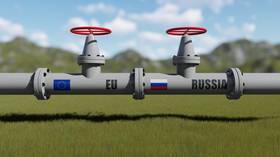Putin wants rubles for Russian gas

Russia will now accept payment for gas exports to "unfriendly countries" in rubles only, President Vladimir Putin said at a meeting with the government on Wednesday.
The president explained that Russia plans to abandon all “compromised” currencies in payment settlements. He added that illegitimate decisions by a number of Western countries to freeze Russia’s assets destroyed all confidence in their currencies.
“I have decided to implement in the shortest possible time a set of measures to change the payments for – yes let’s start with this – for our natural gas supplied to the so-called unfriendly countries in Russian rubles, that is to stop using all compromised currencies for transactions,” the Russian president said.
"It doesn't make sense to deliver our goods to the EU and the US and get paid in dollars and euros," he added.
Putin gave the Central Bank and the government a week to determine the procedure for operations for buying rubles on the domestic market for importers of Russian gas.
The president added that Russia will continue to supply gas in accordance with the volumes and pricing principles of the contracts. Only the currency of payment will change.
The announcement caused a spike in the cost of contracts for gas supply at the TTF European hub, Forbes Russia quoted data from the Intercontinental Exchange as indicating. During Wednesday’s trading, the gas price rose from €97 per megawatt hour (MWh) to approximately €108.5 per 1MWh, but after the president’s speech, it jumped by another €10 to €118.75 per 1MWh, before retreating to €114 per 1MWh as of 1pm GMT.
In the past month, Russia has been hit with several rounds of unprecedented international sanctions over its military operation in Ukraine. The US, EU, and their allies have cut off the country from their financial systems, limited dollar and euro transactions, and froze roughly $300 billion in Russian forex reserves abroad, among other measures. At the same time, they have continued to buy Russian oil and gas.
For more stories on economy & finance visit RT's business section














